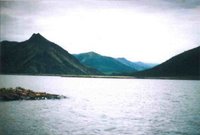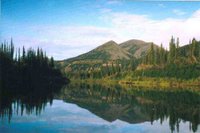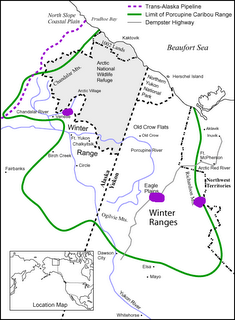The Anglican minister story was not my only encounter with Gwich'in culture. In 1987 I joined my brother's family on a kayaking trip down the Bell and Porcupine Rivers. This is as remote a place as is left on Earth. Scores of miles of impassable muskeg swamp separate the traveler from the nearest village. We flew to Summit Lake
 portaged to the Little Bell River
portaged to the Little Bell River and worked our way down this winding stream to the wide Porcupine River
and worked our way down this winding stream to the wide Porcupine River and then paddled to Old Crow. (My pictures of this trip are still on slides - 1987 and no digital cameras. I have borrowed these photos from a German traveler who took the same adventure more recently. He has several more beautiful, and familiar, pictures on his website. For still more photos and English text, visit here.)
and then paddled to Old Crow. (My pictures of this trip are still on slides - 1987 and no digital cameras. I have borrowed these photos from a German traveler who took the same adventure more recently. He has several more beautiful, and familiar, pictures on his website. For still more photos and English text, visit here.)But this is politics, not travel, and I want to talk about the Gwich'in people. Our first encounter was with a magnificent gentleman named Johnny Charlie whom we had hired to drive us and our equipment up the Dempster Highway to Inuvik. During the long, bump drive along the gravel highway towards and north of the Arctic Circle, Johnny Charlie filled us with stories of wilderness travel. Each story was a subtle yet pointed lesson on survival in his world. When we parted, he gave us his phone number and instructions to call him as soon as we reach Old Crow. He volunteered that if we didn't emerge from the river on schedule he would come looking for us. Johnny Charlie was one of the gentlest, kindest people I've met in my life.
While we were on the river, a man on shore waved us over to him. I'm from Southern California, when that happens here you calculate the odds of getting mugged. But, in the wilderness, when someone beckons you he might need help. We get to shore and the man, I don't remember his name, tells us he had just killed a caribou and he wanted to share the meat with us. A stranger sees four strangers floating on the river and his first thought is to share his food with people he has never seen before and will never see again.
Okay, So What's the Point
The comments to my previous post implied that the Gwich'in people are greedy hypocrites. The comments both seem to draw from this oil and gas industry funded propaganda. The Gwich'in themselves allow oil drilling on the caribou ranges, they said. As is common with propaganda, a little truth is used to tell a lie.
Yes, there is oil exploration on Gwich'in land. It is in the southern winter range for the caribou, marked on the map with the little purple dots. The areas are carefully out of any reserved land and well into the southern, less sensitive, parts of the range.

This is the Canadian government's map. It is easy for migratory animals to avoid small disturbed areas when they scatter seeking winter grazing lands. The difference is that the proposed drilling sites in ANWR are in the calving area. Over 100,000 caribou congregate in a relatively small area to give birth. If our oil needs drives them from prime lands into the foothills the effect on the herd, and on the people who depend on that herd, will be devastating. An analogy would be putting maternity wards and nurseries in construction zones instead of hospitals.
The first time I visited Alaska, in 1981, I heard an Alaskan state legislator say that Eskimos and Indians don't need to subsistence hunt and fish because "they can always shop in a grocery store." For many in those cultures that statement is both absurd and impossible. The Gwich'in culture should not be killed off to feed a few weeks demand for oil. The cost is far greater than the benefit.
Other links: Old Crow, Caribou range, Caribou Commons, National Geographic, Gwich'in Tribal Council, Dene Nation (The Gwich'in are not the only people who depend on the caribou.)
tag: anwr, arctic national wildlife refuge
7 comments:
Post a Comment